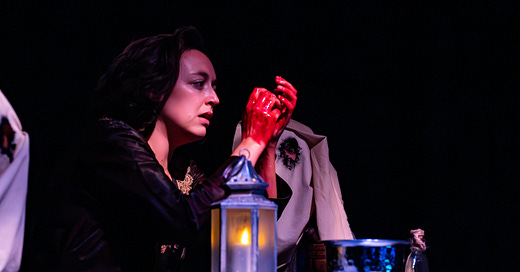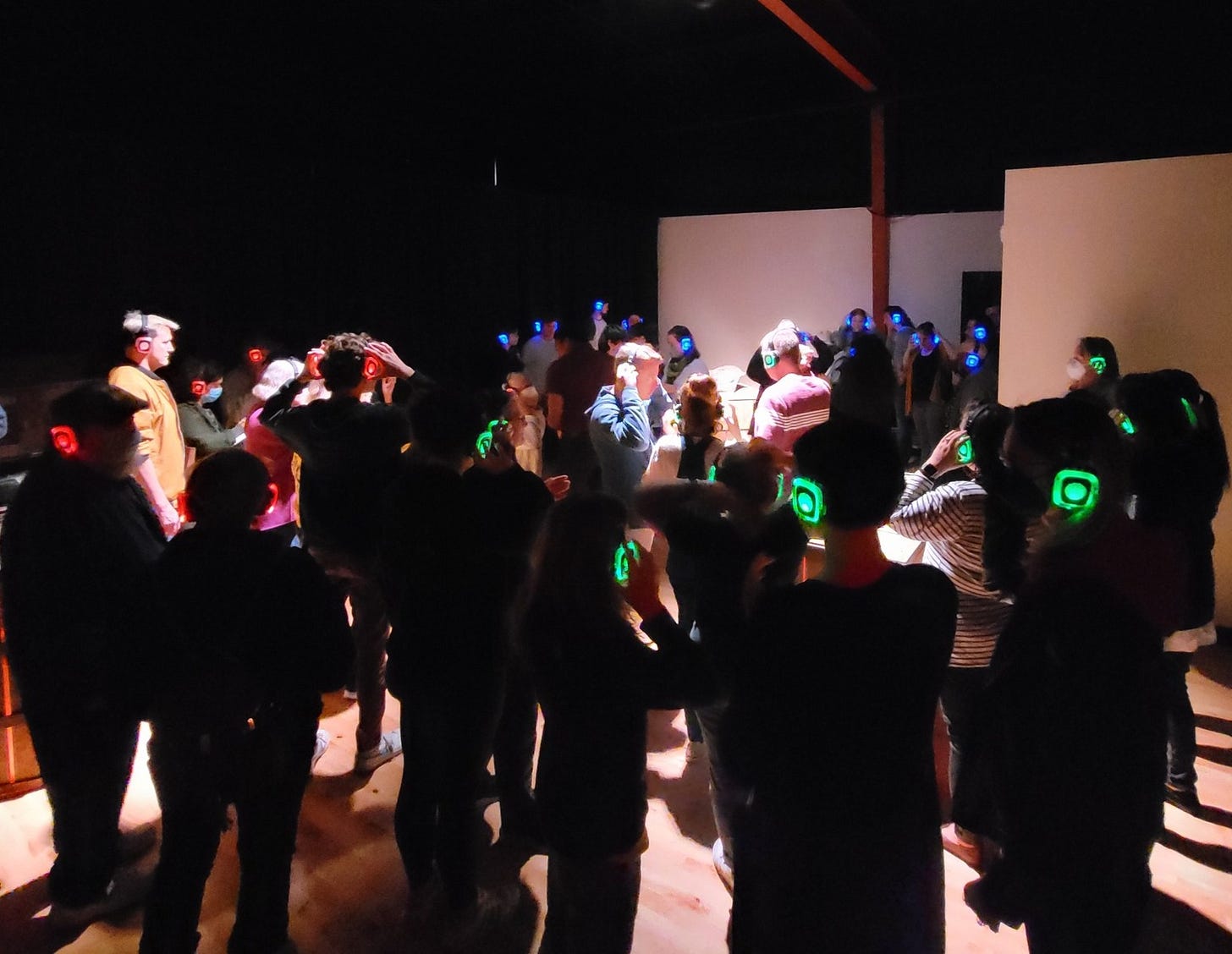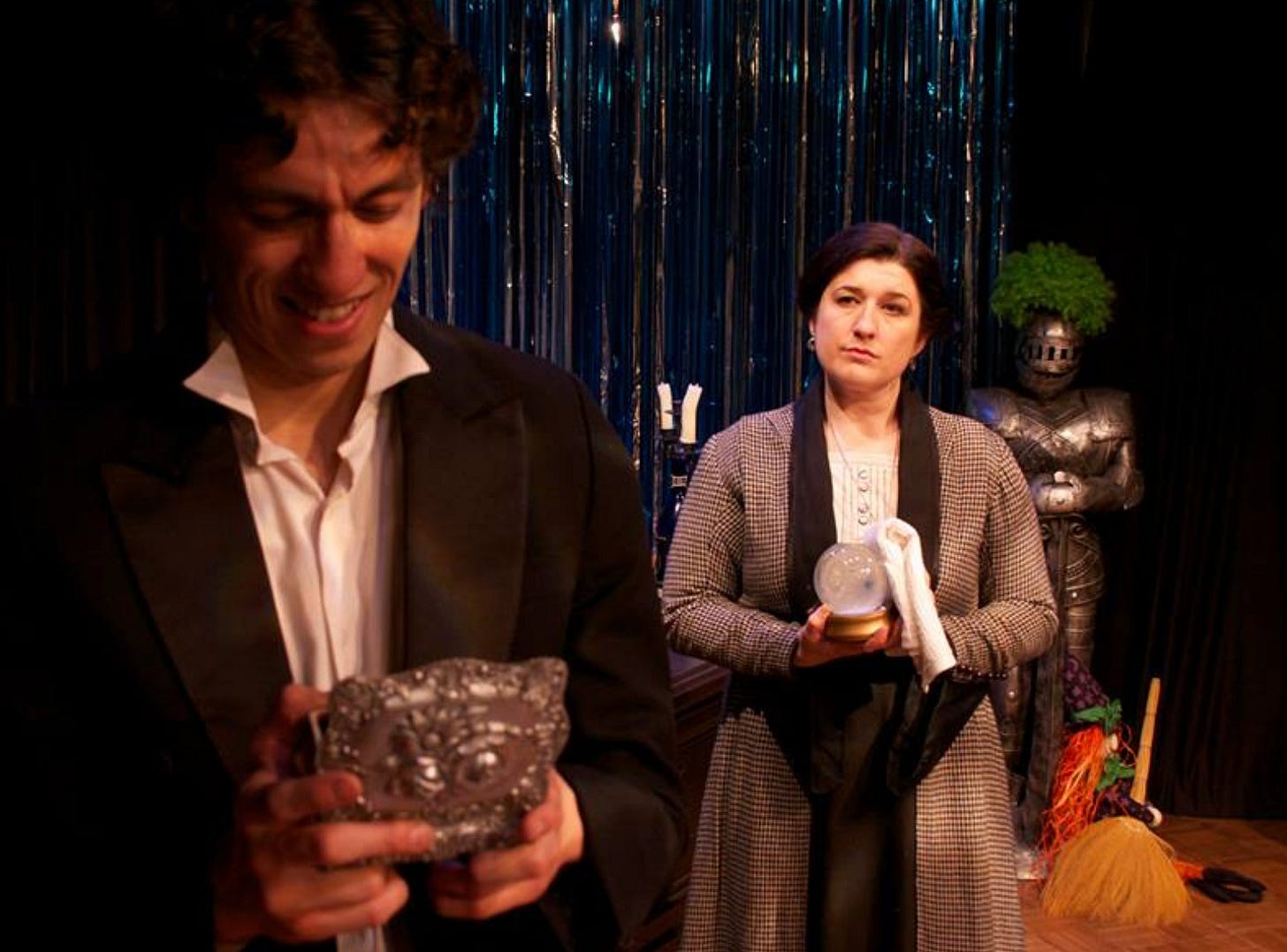BY SYDNEY MEYER
Kentucky Shakespeare ended October by closing “Untimely Ripp’d,” a daring, immersive, choose-your-own-adventure experience inspired by “Macbeth.” The story led audiences through alleyways, parking lots, and curtained-off rooms within the company’s 4800-square-foot rehearsal hall. During the production’s action-packed hour, the production provided noise-canceling headphones so viewers could take in a specially designed accompanying soundscape that featured high-flying British witches, hypnosis, murder, and vows of revenge.
Mollie Murk in Kentucky Shakespeare’s “Untimely Ripp’d” written by Diana Grisanti and Steve Moulds, and directed by Matt Wallace. Photo courtesy Kentucky Shakespeare.
Playwrights Diana Grisanti and Steve Moulds, who are married, are the minds behind this production. The three-week run of their immersive play, “Untimely Ripp’d,” at Kentucky Shakespeare’s 616 Myrtle St home marked the second partnership between the pair and the company after the immersive play, “Enter Ghost” in 2022. Moulds, Grisanti, Kentucky Shakespeare’s Producing Artistic Director, Matt Wallace, and company Associate Artistic Director, Amy Attaway have a history of creating innovative theater in the Louisville area that precedes these most recent productions.
Melding creative sensibilities
The list of Kentucky Shakespeare’s adventurous undertakings includes radio plays, like “War of the Worlds” at Louisville Public Media and its modern retelling of Shakespeare’s “Titus Andronicus” at Play Dance Bar.
Since moving headquarters in 2021 to their 8000-square-foot warehouse in Old Louisville, the company has ventured into using cutting-edge technology, audience participation, and fourth-wall disruptions to replace period dress, proscenium stages, and presentational soliloquies.
Playwrights Diana Grisanti and Steve Moulds. Photo courtesy of the playwrights.
Wallace, named producing artistic director in 2013, has long had an appetite for experimentation, and the motivation to find artists who share his artistic ambitions to tackle immersive theatrical experiences. The company’s 2020 production of “Shakespeare in the Parking Lot,” which came from working under the confines of COVID, was an immersive drive-in production of “Macbeth” that used a radio soundscape to allow audiences to watch actors safely inside their cars.
Later, Wallace and Attaway wanted to develop this immersive style of theater inside Myrtle Street’s warehouse-style rehearsal space. Wallace emphasized they wanted to create unpredictable and untraditional work and knew that Moulds’s and Grisanti’s thinking aligned with their vision.
“That was Steve and Diana,” Wallace says. “It just really struck me that we need the kind of people who are daring, who could mess with the form and be fun to work with.”
Team members describe creating immersive productions as solving a highly technical puzzle. Traditionally, productions begin with a script on which lighting, sets, sound, and staging are based. But Grisanti and Moulds wrote the scripts for “Enter Ghost” and “Untimely Ripp’d” based on an established set — complete with audience traffic patterns.
“Everything that came up that seemed like it was going to be a problem, they turned it into a plot point,” Attaway says.
Attendees of Kentucky Shakespeare’s 2022 “Enter Ghost,” which utilized audience traffic patterns and noise-canceling headphones. Photo courtesy Kentucky Shakespeare.
Moulds points out how Wallace configured the logistics for the production before handing it off to the playwrights.
“He figured out how to divide people into groups and where the groups were going,” Moulds says. “We were taking the ground plan and all the design ideas and everything and trying to be like — and what's the narrative? We were the traditional narrative people.”
That traditional narration is what kept Grisanti and Moulds anchored through the experimental processes. Although “Enter Ghost” and “Untimely Ripp’d” could be seen as disrupting Shakespearian norms, Grisanti and Moulds see themselves as traditionalists. In both productions, the playwrights use a five-act structure.
Adama Abramson in Kentucky Shakespeare’s “Enter Ghost” written by Diana Grisanti and Steve Moulds, and directed by Matt Wallace. Photo courtesy Kentucky Shakespeare.
“Like Shakespeare. Five acts. We're formalists.” Grisanti says. “Basically, the script looks kind of like a regular script, but with a lot of sort of notes to designers.”
“When you merge it all together,” Moulds says, “it looks untraditional. But actually, our job was fairly traditional.”
Falling in love in Texas and a move to Hollywood
Grisanti’s and Moulds’s similar views on theater and writing initially brought them together. They quickly bonded after meeting in the MFA program at the University of Texas at Austin’s Michener Center for Writers.
The two describe themselves as extroverts in a graduate program full of introverts. While their classmates sequestered themselves to write for days on end, Grisanti and Moulds were always looking to socialize. Much of that socializing was spent in a 24-hour coffee shop in Austin.
A scene from Kentucky Shakespeare’s “Untimely Ripp’d” written by Diana Grisanti and Steve Moulds, and directed by Matt Wallace. Photo courtesy Kentucky Shakespeare.
“We spent a lot of time at that 24-hour coffee shop writing, but also talking,” Grisanti says. “We just really like talking about plays, talking to each other and hanging out. We like, really like hanging out. So, we decided to do it forever.”
They only joined writing forces after an assignment to create a play based on an architectural design of a utopian city for UT Austin’s Cohen New Works Festival. It quickly became obvious that the two had complementary writing styles and practices.
“Diana and I were the writers who were most practiced at like, let's put this piece here and we're missing something here,” Moulds says. “We were kind of like the editors of the script together.”
Their romantic and playwriting partnership also took shape during the early 2010’s golden age of television. After graduate school, the two took a leap of faith and moved to Los Angeles to chase TV writing.
“It was like a gold rush,” Moulds says.
“We were like, let's write. Like, let's make money,” Grisanti says. “There's no money in theater. Let's go to LA and write for TV.”
They quickly realized Hollywood was not what they hoped,
“(We) really really really hated LA for so many reasons,” she adds.
Disappointed, the two decided to tackle the long drive back across the country.
Serendipity during a long drive home
“We came back to Louisville to recover emotionally and financially, and the excellent Amy Attaway called Steve, like, literally when he was driving back,” Grisanti said.
The serendipity of this moment still strikes Attaway more than ten years later.
“The fates were looking out for us,” Attaway says.
Zachary Burrell and Jessica May in Grisanti’s and Moulds’s “The Stranger and Ludlow Quinn” produced by Theatre [502] in 2015. Photo courtesy Theatre [502].
Attaway first connected with Grisanti and Moulds while working for Actors Theatre of Louisville. She was in charge of the apprenticeship program, which Grisanti and Moulds were part of at different times before crossing paths in graduate school.
Attaway then went on to launch the contemporary company Theatre [502], with other collaborators in 2011. They had produced a few seasons when a new opportunity arose in 2013.
“A casting director who I was friends with was telling me about her sort of dream of doing a serialized play,” Attaway says. “At the same time, the owner of this old magic theater had reached out to Gil (Reyes), my collaborator, saying, I think I want to rehabilitate this place, and I think that you guys are the right ones to do it.”
When Attaway learned Grisanti and Moulds were heading back to Louisville, she jumped at the opportunity to collaborate.
“I was like, how about I commission you to write a serialized play in a magic theater?” she says.
Moulds describes the opportunity as perfect.
“The timing was kind of amazing,” he says.
The first of a string of collaborations
The result was “The Stranger and Ludlow Quinn.” The play was presented in serialized installments throughout Theatre [502]’s 2013-2014 season. It marks the beginning of an artistic relationship spanning over a decade.
In 2015, Theatre [502] again commissioned Grisanti and Moulds for “The Two Lobbyists of Verona,” which Attaway directed for Kentucky Shakeseare’s summer season. After Attaway joined Kentucky Shakespeare, those were followed by “Enter Ghost,” 2022’s immersive exploration of Hamlet, and the recent “Untimely Ripp’d.”
The cast of Theatre [502]’s 2015 production “The Two Lobbyists of Verona” on the Louisville Central Park stage. Photo courtesy Theatre [502].
These experiences have influenced how Grisanti advises her students at Ball State University, where she serves as assistant professor of playwriting.
“I was telling my students, you have to network laterally, i.e. make friends with your peers because someday your peers will have cool jobs,” Grisanti says. “That’s exactly what happened with Amy.”
Since that 2013 commission, a lot has changed for Grisanti and Moulds. The couple now have a son and Theatre [502], a victim of COVID-19, is no longer operating. But the artistic alliance of Grisanti, Moulds, Attaway, and Wallace has only grown stronger.
“We know each other so well by now,” Moulds says. “In tech for ‘Untimely Ripped,’ there were a couple of times when one of us would be like, oh, I had this idea for this rewrite here. And the other one was like, I had the exact same thought.”
“Yeah,” Grisanti smiles and chimes in, “We spend a lot of time together.”
When asked what was up next for the crew at Kentucky Shakespeare, Wallace indicated something in the “gothic horror category” could be on the table for upcoming seasons without giving specifics.
But given the tradition-bending hits Grisanti and Moulds have helped Kentucky Shakespeare bring to the stage, their work will likely be part of the company’s coming seasons.
Sydney Meyer, a Louisville-based writer, holds an undergraduate degree in Theatre Arts from Boston University. After building affordable housing in Colorado with AmeriCorps, Sydney recently returned to her hometown. In addition to her work as a writer, she freelances as a social media manager.










